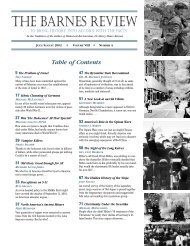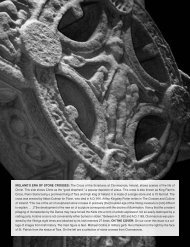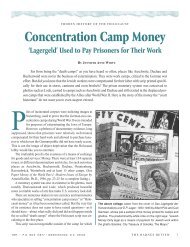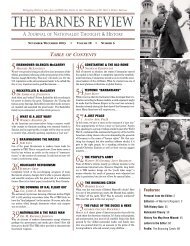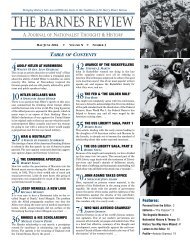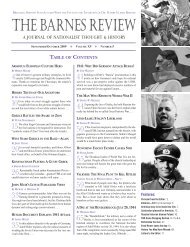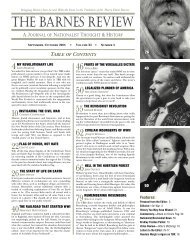You also want an ePaper? Increase the reach of your titles
YUMPU automatically turns print PDFs into web optimized ePapers that Google loves.
PAGE 46 the barnes review MAY/JUNE<br />
[to whom] I am deeply indebted for inspiration<br />
and assistance in every stage of the<br />
preparation of my manuscript.” 3—A splendid,<br />
but not surprising, tribute to this publication’s<br />
inspiration and namesake.<br />
Unless you are fortunate enough to<br />
have read professors <strong>Barnes</strong> and<br />
Tansill, the best you are apt to hear about<br />
our bombing and destruction of nearly<br />
700,000 Japanese civilians4 during World<br />
War II is that “they had it coming for what<br />
they did at Pearl Harbor.” Even though the<br />
victims here were Asian women, children<br />
and elderly, their killers for the most part<br />
were white, wealthy liberals, which apparently<br />
made the violence against their victims<br />
acceptable, just as it does today in<br />
Idaho, Texas, Florida, Serbia and Sudan.<br />
By such tormented logic, we are informed<br />
that Ja panese civilians were rightfully<br />
slaughtered in the hundreds of thousands<br />
and their country torched for what their<br />
leaders did in Nanking, Hawaii and the<br />
Philippines.<br />
We are also expected to believe that<br />
America went to war in 1941 because the<br />
“Japs bombed Pearl Harbor.” Usually the<br />
matter rests, ipse dixit, upon that bare<br />
assertion. To question the proposition is to<br />
be impatiently dismissed by FDR’s defenders<br />
as unworthy of serious consideration.<br />
As a leftist article of faith, it has earned<br />
unquestioning acceptance since it was purchased<br />
with the lives of 300,000 young<br />
Americans. Once you have paid those<br />
wages, you are not likely to disavow the<br />
labor. And the more time that passes the<br />
less likely any abnegation of the enterprise.<br />
In the 1974 Paramount production,<br />
Chinatown an obscenely wealthy murderer,<br />
extortionist and pedophile politician<br />
Noah Cross (played by John Huston) tells<br />
private detective J.J. Gettes (Jack Nichol -<br />
son), “Politicians, ugly buildings and<br />
whores all get respectable if they last long<br />
enough.” He might have added to his list,<br />
lies told by rulers to their subjects to justify<br />
and conceal murder.<br />
With 12 million men under arms at the<br />
height of the war between 1941 and 1945,<br />
hardly a family in America did not have<br />
someone in the conflict, engaged in the war<br />
effort, lose someone in battle or to wounds,<br />
or know of someone so lost. It became an<br />
intensely personal war. Front windows in<br />
family homes were adorned with little,<br />
square, fringed rayon pennants sporting a<br />
blue star on a white field for every son from<br />
that home in the service and a gold star for<br />
every one killed in battle. Casualty lists<br />
published in the newspaper were posted in<br />
store fronts and barber shops. We bought<br />
war bonds, war savings stamps and sold<br />
rendered fat from our cooking to the neighborhood<br />
butcher. Gold Star Moms, gas<br />
rationing, leg painting (due to the dearth of<br />
nylons), scrap drives and blackouts were<br />
daily reminders of the enormous price<br />
America and its youngsters were paying<br />
for this bloodiest of globalist adventures.<br />
Even though we were a different people<br />
then, a stronger, cohesive people with a<br />
com mon history and a sense of ourselves,<br />
FDR and his elite band of internationalists,<br />
nonetheless, locked us into a savage warfare<br />
state, where hatred of the “Japs” was<br />
de rigeur. Not surprisingly, this pervasive<br />
malevolence has been relied upon ever<br />
since to rationalize the carnage Roosevelt<br />
un leashed and make questioning the righteousness<br />
of his “crusade” heresy.<br />
But, since truth’s losing struggle with<br />
the corrupt and mendacious presidency of<br />
Bill Clinton, it has become inescapable for<br />
most intelligent people to ask, as did professors<br />
<strong>Barnes</strong> and Tansill 50 years ago,<br />
“Why did the Japs bomb Pearl Harbor?”<br />
How “surprised,” for that matter, was<br />
Roosevelt about Japan’s attack? 5 Historian<br />
Paul Johnson gives a partial answer in<br />
Modern Times when he writes: “Roosevelt<br />
had always been aggressive-minded in<br />
Asia.” As early as December 1937, Johnson<br />
relates, FDR had proposed to Britain a<br />
total blockade of Japan. In fact, Roosevelt<br />
regarded war with Japan as inevitable<br />
and ...saw advantages in precipitating it<br />
(emphasis added). 6<br />
In 1542 the Portuguese discovered Japan<br />
and opened trade in Kyushu. Within 30<br />
years they had established a major port at<br />
Nagasaki. <strong>The</strong>y brought with them lucrative<br />
trade arrangements, Jesuit missionaries<br />
and firearms. Shortly thereafter, Span -<br />
ish Franciscans followed and quickly be -<br />
came competitors with the Society of Jesus<br />
for religious, commercial and political<br />
influence in the Japans. Within a few years<br />
the new shogun, Teyasu Tokugawa, be came<br />
alarmed at the growth of Chris tian ity,<br />
Jesuit political intrigue and the internal<br />
threat to his authority posed by the growing<br />
foreign influence. By 1638, after bloody<br />
suppression of the Franciscans a few years<br />
earlier, the Portuguese and Span ish were<br />
expelled.<br />
<strong>The</strong> early Japanese elite were poets as<br />
well as rulers. Out of this class of ruler elite<br />
emerged the warrior-aristocrat, which<br />
appeared by the 11th century in the person<br />
of the samurai and “remains the most distinctly<br />
Japanese type of leader down to<br />
modern times.” 7<br />
Samurai were raised from early child-<br />
hood to serve and die for their liege lord or<br />
daimyo. Above all, death was not to be<br />
avoided but embraced. <strong>The</strong>y were exempt<br />
from taxation; they alone were permitted<br />
to have two names; they performed no<br />
man ual labor; they received a regular sti -<br />
pend from their daimyo; and, for most of<br />
their history, they were the only members<br />
of Japanese society permitted to bear arms.<br />
It was no minor matter that they had the<br />
right to kill, at once, any member of the<br />
lower classes who offended them. Until the<br />
17th century, every daimyo had his own<br />
private army of samurai, which might vary<br />
in size from dozens of men to thousands.<br />
Samurai adhered to a rigid discipline<br />
called bushido, which among all of its<br />
prin ciples came down to one thing: death in<br />
his master’s service. Each samurai be lieved<br />
that he had but one duty: “to firmly grasp<br />
his sword and die.” 8 After all, “is not man<br />
but a blossom taken by the wind?” 9 In fact,<br />
dying was his chief business, 10 and upon<br />
this creed the samurai meditated: the<br />
inevitability of death and the transitoriness<br />
of all things, especially human life. 11<br />
In his epic novel, Musashi, based on the<br />
life of a renowned 17th-century samurai,<br />
Miyamoto Musashi, author Fiji Yoshikawa<br />
describes a poignant farewell scene be -<br />
tween our hero, Musashi, and Otsu, the girl<br />
who loves him. Musashi is departing to<br />
duel Kojiro, the most famous and deadliest<br />
of all samurai. Otsu, fearful that Musashi<br />
will be killed by Kojiro, promises she will<br />
commit seppaku (suicide) if he dies. Mu -<br />
sashi protests, but Otsu is firm:<br />
I look forward with pleasure to the<br />
day I die. It will be like a glorious morning<br />
when the birds are singing. I will go<br />
as happily as I would to my wedding. I<br />
am not throwing my life away for a useless<br />
cause. I have chosen to do what I am<br />
doing, because by dying I can achieve<br />
eternal life. 12<br />
This brief soliloquy encapsulates the<br />
samurai sentiment toward death and is<br />
repeated by various characters throughout<br />
the massive work. <strong>The</strong> book was published<br />
in 1935—six years before Pearl Harbor—in<br />
serialized form in Japan’s largest and most<br />
prestigious newspaper, Asahi Shimbun.<br />
Are we to assume that no one among FDR’s<br />
gaggle of liberal intellectuals bothered to<br />
read this Japanese equivalent of Gone With<br />
the Wind and attempt to determine if such<br />
folklore in any way imitated Japanese life?<br />
<strong>The</strong> samurai did not luxuriate in a carefree<br />
or thoughtless existence. It was one<br />
marked by deep reflection, discipline and<br />
by a severe code, the breach of which meant



